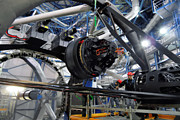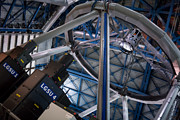Anuncio
Instalación de óptica adaptativa del VLT de ESO obtiene premio Paul F. Forman Team Engineering Excellence Award
18 de Septiembre de 2018
La Sociedad de Óptica (OSA) ha reconocido el trabajo pionero realizado por el equipo de la instalación de óptica adaptativa (AOF) de ESO. El premio Paul F. Forman Team Engineering Excellence Award 2018 ha sido otorgado al equipo, que recibió el galardón de OSA durante la ceremonia de premiación Fronteras de la Öptica (FiO) + Ciencia con Láseres (LS) realizada el 17 de septiembre en Washington, DC., EE.UU.
El premio fue conferido al equipo por su trabajo para proporcionar óptica adaptativa a los instrumentos de la Unidad de Telescopio 4 Yepun de 8,2 metros, del Very Large Telescope de ESO. El AOF constituyó un proyecto de gran envergadura para mejorar la visión de los instrumentos MUSE Multi Unit Spectroscopic Explorer y HAWK-I High Acuity Wide-field K-band Imager, permitiéndoles compensar el efecto de emborronamiento provocado por la atmósfera terrestre [1].
La ingeniería de gran complejidad y precisión tras el AOF ha sido reconocida con el premio Paul F. Forman Team Engineering Excellence Award, el cual recibieron Elise Vernet, Johann Kolb y Robin Arsenault, en nombre del equipo AOF. El premio se confiere cada año para conmemorar logros técnicos sobresalientes o contribuciones a la sociedad en el ámbito de la ingeniería óptica y se ha otorgado en otras oportunidades a equipos de ingenieros que trabajan en proyectos de vanguardia, tales como el “Advanced LIGO experiment”, que se utilizó para detectar ondas gravitacionales provenientes de la colisión de agujeros negros y estrellas de neutrones.
La ingeniería detrás de los telescopios de ESO ha sido reconocida anteriormente con este prestigioso galardón. En 2017, la Guide Star Alliance recibió el premio por la producción de estrellas guía láser de gran potencia (SodiumStar). SodiumStar fue el resultado de una asociación entre el equipo AOF de ESO, TOPTICA Photonics y MPB Communications (MPBC), y ha sido identificada como una tecnología clave para la próxima generación de telescopios terrestres [2].
Mediante este claro ejemplo de ingeniería innovadora, el equipo AOF ha dotado a los astrónomos de los Estados Miembros de ESO con una valiosa herramienta para explorar el universo. Además, la experiencia adquirida por los ingenieros de ESO será esencial para superar desafíos futuros de la ingeniería, tales como los que plantea la construcción del Extremely Large Telescope, el ojo más grande del mundo para mirar el cielo.
Notas
[1] El AOF se compone de diversas partes que trabajan juntas e incluye las instalaciones Four Laser Guide Star Facility y el espejo secundario deformable muy fino de UT4. El 4LGSF emite al cielo cuatro rayos láser de 22 vatios para hacer que brillen los átomos de sodio de las capas superiores de la atmósfera, produciendo manchas de luz en el cielo que imitan a estrellas. Los sensores de los módulos GRAAL y GALACSI utilizan estas estrellas artificiales para determinar las condiciones atmosféricas y las correcciones que se requieren para mejorar la calidad de las imágenes. Mil veces por segundo, el sistema AOF se adapta a las condiciones atmosféricas, cambiando la forma del espejo secundario deformable del telescopio con el fin de compensar las perturbaciones atmosféricas. Ello requiere coordinar diversos subsistemas y permite a la AOF proporcionar una visión de exquisita sensibilidad a MUSE y HAWK-I.
[2] Otras alianzas industriales han resultado fundamentales para el éxito del AOF. Microgate y ADS hicieron entrega del espejo secundario deformable, parte integral del cual es el delgado espejo de 1,1m, producido por SAGEM-REOSC. NTE Sener entregó el sistema opto-mecánico GRAAL y TNO construyó telescopios de lanzamiento para la Instalación de Cuatro Estrellas Guías Láser. NOVA realizó una contribución fundamental al sistema ASSIST que permitió avalar al AOF en Europa y el consorcio MUSE, proporcionando también un instrumento de vanguardia que contribuyó al rendimiento del AOF.
Enlaces
Contactos
Robin Arsenault
AOF Project Manager
Garching bei München, Alemania
Tel: +49 89 3200 6524
Correo electrónico: rarsenau@eso.org
Calum Turner
Encargado de Prensa ESO
Garching bei München, Alemania
Tel: +49 89 3200 6670
Correo electrónico: pio@eso.org
Sobre el anuncio
| Identificador: | ann18066 |
Our use of Cookies
We use cookies that are essential for accessing our websites and using our services. We also use cookies to analyse, measure and improve our websites’ performance, to enable content sharing via social media and to display media content hosted on third-party platforms.
ESO Cookies Policy
The European Organisation for Astronomical Research in the Southern Hemisphere (ESO) is the pre-eminent intergovernmental science and technology organisation in astronomy. It carries out an ambitious programme focused on the design, construction and operation of powerful ground-based observing facilities for astronomy.
This Cookies Policy is intended to provide clarity by outlining the cookies used on the ESO public websites, their functions, the options you have for controlling them, and the ways you can contact us for additional details.
What are cookies?
Cookies are small pieces of data stored on your device by websites you visit. They serve various purposes, such as remembering login credentials and preferences and enhance your browsing experience.
Categories of cookies we use
Essential cookies (always active): These cookies are strictly necessary for the proper functioning of our website. Without these cookies, the website cannot operate correctly, and certain services, such as logging in or accessing secure areas, may not be available; because they are essential for the website’s operation, they cannot be disabled.
Functional Cookies: These cookies enhance your browsing experience by enabling additional features and personalization, such as remembering your preferences and settings. While not strictly necessary for the website to function, they improve usability and convenience; these cookies are only placed if you provide your consent.
Analytics cookies: These cookies collect information about how visitors interact with our website, such as which pages are visited most often and how users navigate the site. This data helps us improve website performance, optimize content, and enhance the user experience; these cookies are only placed if you provide your consent. We use the following analytics cookies.
Matomo Cookies:
This website uses Matomo (formerly Piwik), an open source software which enables the statistical analysis of website visits. Matomo uses cookies (text files) which are saved on your computer and which allow us to analyze how you use our website. The website user information generated by the cookies will only be saved on the servers of our IT Department. We use this information to analyze www.eso.org visits and to prepare reports on website activities. These data will not be disclosed to third parties.
On behalf of ESO, Matomo will use this information for the purpose of evaluating your use of the website, compiling reports on website activity and providing other services relating to website activity and internet usage.
Matomo cookies settings:
Additional Third-party cookies on ESO websites: some of our pages display content from external providers, e.g. YouTube.
Such third-party services are outside of ESO control and may, at any time, change their terms of service, use of cookies, etc.
YouTube: Some videos on the ESO website are embedded from ESO’s official YouTube channel. We have enabled YouTube’s privacy-enhanced mode, meaning that no cookies are set unless the user actively clicks on the video to play it. Additionally, in this mode, YouTube does not store any personally identifiable cookie data for embedded video playbacks. For more details, please refer to YouTube’s embedding videos information page.
Cookies can also be classified based on the following elements.
Regarding the domain, there are:
- First-party cookies, set by the website you are currently visiting. They are stored by the same domain that you are browsing and are used to enhance your experience on that site;
- Third-party cookies, set by a domain other than the one you are currently visiting.
As for their duration, cookies can be:
- Browser-session cookies, which are deleted when the user closes the browser;
- Stored cookies, which stay on the user's device for a predetermined period of time.
How to manage cookies
Cookie settings: You can modify your cookie choices for the ESO webpages at any time by clicking on the link Cookie settings at the bottom of any page.
In your browser: If you wish to delete cookies or instruct your browser to delete or block cookies by default, please visit the help pages of your browser:
Please be aware that if you delete or decline cookies, certain functionalities of our website may be not be available and your browsing experience may be affected.
You can set most browsers to prevent any cookies being placed on your device, but you may then have to manually adjust some preferences every time you visit a site/page. And some services and functionalities may not work properly at all (e.g. profile logging-in, shop check out).
Updates to the ESO Cookies Policy
The ESO Cookies Policy may be subject to future updates, which will be made available on this page.
Additional information
For any queries related to cookies, please contact: pdprATesoDOTorg.
As ESO public webpages are managed by our Department of Communication, your questions will be dealt with the support of the said Department.



